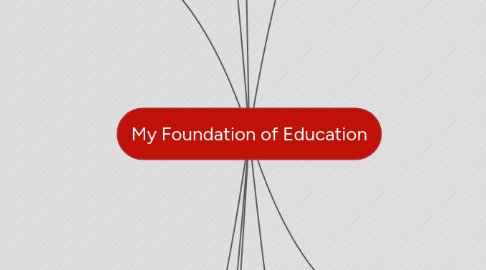
1. Equality of Opportunity
1.1. "An individual's origin has a significant impact on his or her destination."
1.2. education is related to mobility - this impacts race, sex and socio economic division of opportunities
1.3. "who you are is almost as significant a factor as what you know."
1.4. Headstart program or free preschool for all 3 and 4 year olds in low income urban districts was designed to give those children a way to close the gap between the middle and upper income students so that they all start off on the same level. Unfortunately, that is not soon enough to close the gap.
1.5. The Coleman Study
1.5.1. Round Three confirms data from 1966 and 1982
1.5.2. The socio-economic composition of a school has a greater impact on the success of the students than their personal socio-economic status.
1.5.3. race and socioeconomic status are an indicators/predictors of academic success
1.5.4. suggests that academic reform must focus on elimination of high degrees of segregation
2. Educational Inequality
2.1. Educational outcomes are largely based on family background
2.2. John Ogbu - Cultural Differences Theories
2.3. main reason for unequal achievement of african american students had to do with student, parental and community cultures - Ogbu
2.4. School funding based inequality - Jonathan Kozol - documented vast differences in affluent suburbs vs poor inner cities.
2.5. Serrano v Priest - california supreme court
2.6. Gender and schooling issues - Clarence Thomas/Anita Hill incident
3. Educational Reform
3.1. School Choice using controlled choice
3.1.1. keeps racial balance in tact
3.1.2. Boston is an example of a controlled choice system
3.2. School-Businsess Partnerships
3.2.1. "Billionaire boys club"
3.2.1.1. Mark Zuckerberg - Facebook - $100 million contributed
3.2.1.2. Bill Gates - Gates Foundation
3.2.2. much of the funding is decreasing of late
3.3. School to Work Programs
3.3.1. school based learning
3.3.2. connecting activities
3.3.3. work based learning
3.4. Effective School Movement
3.4.1. Ron Edmonds
4. Politics of Education
4.1. Intellectual
4.1.1. Teach Reading, Writing, mathmatics
4.1.2. transmit specific knowledge
4.1.2.1. literature
4.1.2.2. history
4.1.2.3. sciences
4.1.3. help students acquire higher order thinking skills
4.1.3.1. analysis
4.1.3.2. evalauation
4.1.3.3. synthesis
4.2. Political
4.2.1. inculcate allegiance to existing political order
4.2.2. prepare citizens who participate in political order
4.2.3. help assimmilate diverse cultural groups into a common political order
4.2.4. teach children the basic laws of society
4.3. Social
4.3.1. help solve social problems
4.3.2. work as one of many social institutions such as family and church to assure social cohesion
4.3.3. socialize children into the vaious rolesm, behaviors and values of society
4.4. Economic
4.4.1. prepare students for their later occupational roles
4.4.2. select train and allocate individuals into the division of labor
4.5. My political perspective
4.5.1. Conservative Perspective
4.5.1.1. Charles Darwin
4.5.1.2. William Graham Sumner
4.5.1.3. Adam Smith
4.5.1.4. Milton Friedman
4.5.1.5. Ronald Regan
4.6. My vision of Education
4.6.1. Traditional Vision
4.6.1.1. pass on the best of what was and what is
4.6.1.2. schools are necessary to the transmission of values of US society
4.6.1.2.1. hard work
4.6.1.2.2. individual intiative
4.6.1.2.3. family unity
5. History of U.S. Education
5.1. Reform Movement - Education for All
5.1.1. emergence of public high schools
5.1.2. Compulsory
5.1.3. taxes were levied to fund public school
5.1.4. The committee of ten
5.1.5. The cardinal principles
5.1.6. education as life preparation
5.2. Historical Interpretation - Democratic-Liberal School
5.2.1. Progressive evolution of a school system committed to Providing equal opportunity for all
5.2.2. Ellwood Cubberly
5.2.3. Merle Curti
5.2.4. Lawrence Cremin
5.2.5. Common School Era
5.2.6. Goal of Equality and Excellence
6. Sociological Perspectives
6.1. Functional Theoretical Perspective
6.1.1. Interdependence of the social system
6.1.2. Emile Durkheim
6.1.2.1. Education critical in creating the moral unity needed for social cohesion and unity
6.1.2.2. Moral values are the foundation of society
6.1.3. Consensus is normal state
6.1.4. Conflict is a breakdown of shared values.
6.2. Effects of Schooling on Individuals
6.2.1. Knowledge and Attitudes
6.2.2. Student Peer Groups and Alienation
6.2.3. Inadequate Schools
7. Philosophy of Education
7.1. Pragmatism
7.1.1. Goal of Education
7.1.1.1. function as preparation for life in a democratic society
7.1.1.2. social role of school and its effects on social, intellectual and personal development
7.1.1.3. schools instilled democratic and cooperative values
7.1.1.4. large project of social progress
7.1.1.5. socializing diverse groups into a cohesive democratic community
7.1.1.6. George Sanders Pierce
7.1.1.7. William James
7.1.2. Role of teacher
7.1.2.1. teacher not authoritarian
7.1.2.2. teacher encourages and suggests questions
7.1.2.3. John Dewey
7.1.2.4. John Locke
7.1.3. curriculum
7.1.3.1. Dewey thought the children should pose the questions about what they want to know
7.1.3.2. teacher encourages and takes suggestions
7.1.3.3. problem solving
7.1.3.4. Deweys intergrated curriculum
7.1.3.5. curriculum changes as the childrens interest and needs change
7.1.3.6. Francis Bacon
7.1.4. Instructional Methods
7.1.4.1. formal instruction abandonded
7.1.4.2. classroom has tables and chairs for group activities
7.1.4.3. appears chaotic
7.1.4.4. learning in a nontraditional yet natural way
7.1.4.5. Jean Jacques Rousseau
8. Schools as Organizations
8.1. The Nature of Teaching
8.1.1. Wear Many Hats
8.1.2. Teach the students
8.1.3. Deal with each child individually
8.1.4. Classroom strategies and teaching styles develop
8.1.5. Rewards are derived from the student
8.1.6. Routine
8.1.7. Creativity required
8.1.8. committment to the subject matter
8.2. Teacher Professionalization
8.2.1. difficult for teachers to have professional autonomy
8.2.2. professionalization of the teachers is often tied to the school and/or administrator
8.2.3. school based management - a reform possibllity with a goal of teacher professionalization.
9. Curriculum and Pedagogy
9.1. Major Stakeholders in my school district
9.1.1. State Senator Bill Holtzclaw
9.1.2. State House of Representative Mac Macutcheon
9.1.3. State Superintendent Tommy Bice
9.1.4. State School Board - Mary Scott Hunter
9.1.5. Superintendent Tom Sisk
9.1.6. School Board Member - Earl Glaze
9.2. Developmentalist Curriculum theory
9.2.1. Dewey
9.2.2. Ravitch
9.2.2.1. romantic progressivism
9.2.2.2. AS Neill - Summerhill boarding school
9.3. Hidden approach to Curriculum
9.3.1. implicit rules and messages
9.3.2. what is left out of formal curriculum
9.4. Pedagogic practice - mimetic tradition
9.4.1. Diadactic method
